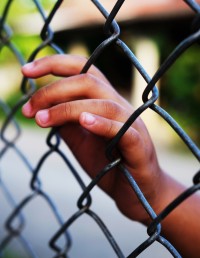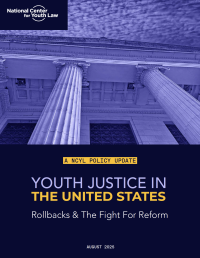Deal Reached in Sara Kruzan's Case
Parole A Possibility After a Long Struggle
By Bryn Martyna
Parole for Sara Kruzan is, at long last, a real possibility following a recent deal reached between her attorneys and the district attorney’s office in Riverside, California. Kruzan was sentenced to life without the possibility of parole in 1994 for the shooting death of her pimp when she was 16. The pimp had sexually abused her since she was 11, and he began trafficking her as a prostitute when she was 13. Over the years her case has become a rallying cry for those trying to do away with life without parole (LWOP) sentences for crimes committed by juveniles, as well as for those fighting on behalf of victims of human trafficking.
The deal was announced in court in Riverside on January 18. It reduces Kruzan’s conviction from first-degree murder to second-degree murder with use of a gun, and reduces her sentence from life without the possibility of parole to 19 years to life. Kruzan has already served almost 19 years in prison.1 The agreement makes her eligible to go before the state parole board – which will likely happen within the next six months or so – but does not guarantee that she will be paroled. In exchange for Kruzan dropping her appeal, which is pending, the district attorney’s office will remain neutral if the state parole board determines that Kruzan is eligible for release.2
Kruzan’s Story
Sara Kruzan was raised in Riverside by an abusive mother who was addicted to drugs. Kruzan was abused by her mother’s boyfriends beginning at age 5, and her mother kicked her out when she was 11.3 She was then befriended by a 31-year-old man named G.G., who she described as “like a father figure” who would “talk to me and take me out and give me all these lavish gifts and do all these things for free.”4 When she was 13, he raped her and forced her into prostitution. Kruzan was just two months past her sixteenth birthday when she shot and killed G.G.5
At the time of her sentencing, the California Youth Authority evaluated Kruzan and determined that she was “amenable to the training and treatment” offered by the state’s juvenile justice system. She had never been arrested before, and had been an honor student and ran track. And yet, instead of being placed in the juvenile system, which would have resulted in her release at age 21, Kruzan was tried as an adult and sentenced to serve the rest of her life in adult prison.6
Attempts to Free Kruzan
Since Kruzan’s sentencing in 1995, there have been occasional glimmers of hope and multiple setbacks. Kruzan’s request for a new trial was pending for years before the latest deal was reached. In 2010, Kruzan petitioned the Riverside Superior Court, where she was originally convicted, for a new trial, and the request was denied. She then appealed to the 4th District Court of Appeal. NCYL worked with attorneys from Perkins Coie on the appeal.7 The Court of Appeal upheld the denial of Kruzan’s request for a new trial, and Kruzan appealed to the California Supreme Court.
That appeal marked an important turning point in her case. On June 20, 2012, the California Supreme Court ordered a new hearing in Riverside Superior Court on the issue of whether Kruzan was entitled to a new trial in which she would be allowed to present a battered partner defense.
In her original trial, Kruzan was not permitted to present such a defense. Years later, in 2012, the California attorney general’s office changed its position on whether Kruzan could appropriately be considered a victim of domestic violence. Originally, the attorney general argued that Kruzan had only a prostitute-pimp relationship and thus could not be considered a victim of domestic violence. In an April 17, 2012, letter response to the California Supreme Court, the attorney general’s office changed its stance, conceding that “it is perverse to suggest that a minor who has been sexually abused and exploited from the age of 11 should be entitled to lesser defenses than an adult who has been in an abusive dating relationship.”8
There followed a number of extensions to the deadline for Riverside prosecutors to respond to the order for a new hearing.9 The delays, to which Kruzan’s lawyers did not object, led many observers to suspect that a deal was being worked out behind the scenes. Their suspicions proved correct.
In addition to the legal challenges to Kruzan’s original conviction and sentence, there have been many efforts outside the courtroom to secure her freedom. In 2010, when Kruzan petitioned then Governor Arnold Schwarzenegger for a complete pardon, many high-profile people rallied to her side. Over 60,000 members of Change.org signed petitions supporting her request for clemency.10 Kruzan’s clemency petition emphasized the absence of expert testimony at trial explaining how her actions were affected by the years of abuse she endured; the document also focused on her status as a juvenile when the offense occurred and her subsequent rehabilitation in prison, where she earned a bachelor’s degree and lived in the honor dorm. In the petition she wrote, “[t]he woman I am today is … capable of making healthy choices for myself. … Today I can and do lead a life of example for others.” Although Schwarzenegger did not pardon Kruzan, in January 2011 he commuted her life sentence to 25 years to life with the possibility of parole.11
A Case at the Crossroads of Various Movements
That Kruzan has drawn support from people across this country and around the world is, in a sense, not surprising. Her case exists at the intersection between two growing movements: the movement to end LWOP sentences for crimes committed by juveniles and the movement to end sex trafficking. Both have made significant progress in the 18 years that Kruzan has been in prison. In 2012 California enacted a law (Senate Bill 9) that allows some inmates sentenced to LWOP as juveniles to petition for resentencing. The bill’s author, State Sen. Leland Yee (D-San Mateo/San Francisco), had appeared on “Dr. Phil” along with members of Kruzan’s family to raise awareness of her story and to press for the bill’s passage.12 When Proposition 35, the Californians Against Sexual Exploitation Act initiative, was placed on the California ballot, the main Kruzan advocacy website, freesarakruzan.org, urged followers to vote yes. The initiative was approved by a landslide in November 2012.13
A foundational event in the drive to draw attention to Kruzan’s plight was the videotaping by Human Rights Watch of an interview with Kruzan in prison in 2006. Kruzan spoke about the rape and abuse she suffered since age 11, but also took responsibility for her crime: “You don’t just take somebody’s life and think that it’s OK.” At first the video garnered little attention, but in 2007 Sen. Yee posted it on his YouTube account. Two years later, a former inmate who befriended Kruzan began spreading the video via social media. The actress Demi Moore, who is active in Human Rights Watch’s campaign against sex trafficking, saw the video and tweeted a link to it, whereupon it went viral.14 Just recently, Kruzan’s story was featured in a public service announcement against human trafficking by the Canadian organization Traffic Jam Canada.15
Lessons Learned
Although the deal between Kruzan’s attorneys and the Riverside district attorney marks a significant breakthrough, Kruzan remains in prison in Chowchilla, Calif. There is no guarantee that she will be granted parole. Still, there are lessons to be learned from her case up to this point. Clearly, individual cases like Kruzan’s that attract sympathy can lend momentum to broader movements. Her face and her story have been used to bolster arguments against LWOP sentences for crimes committed by juveniles, and for the need to end human trafficking. Kruzan’s case also shows how relatively new forms of media can be powerful strategic tools in the hands of individuals as well as movements. Significant attention to her plight has largely come from media services — YouTube, Facebook, and Twitter — that didn’t even exist at the time of her original conviction. And yet, larger lessons aside, Kruzan’s personal, ongoing quest for freedom and a new life remains compelling, urgent, and worthy of our support.
Bryn Martyna is a former Skadden Fellow and Staff Attorney at NCYL.
- Richard K. De Atley, Sara Kruzan Case: Conviction Reduced; Parole Possible, The Press-Enterprise, Jan. 18, 2013, http://www.pe.com/
- Id.
- Amita Sharma, AG Reverses Decision on Woman Who Killed Her Pimp, KPBS, April 17, 2012, http://www.kpbs.org/news/2012/apr/17/ag-reverses-decision-woman-who-kil…
- Id.
- Sara Kruzan, Sentenced to Life Without Parole, National Center for Youth Law, http://www.youthlaw.org
- Id.
- NCYL Seeks Release of Sara Kruzan, Sentenced to Life in Prison at Age 16, National Center for Youth Law Press Release, 2010, http://www.youthlaw.org
- Amita Sharma, AG Reverses Decision on Woman Who Killed Her Pimp, KPBS, April 17, 2012, http://www.kpbs.org/
- Richard K. De Atley, New Date to be Set in Kruzan Case, The Press-Enterprise, Dec. 7, 2012, http://www.pe.com/
- Victory, Change.org, Jan. 2011, http://www.change.org/
- http://www.youthlaw.org/
- “Dr. Phil” Show, Tense Reunions, Oct. 17, 2012, drphil.com/shows/show/1896
- Drew Joseph and Jill Tucker, Prop. 35: Trafficking Measure Passes, San Francisco Chronicle, Nov.7, 2012, http://www.sfgate.com/
- Richard K. De Atley, Sara Kruzan Case: Conviction Reduced; Parole Possible (Sara Kruzan Timeline), The Press-Enterprise, Jan. 18, 2013, http://www.pe.com/
- www.trafficjamcanada.org





